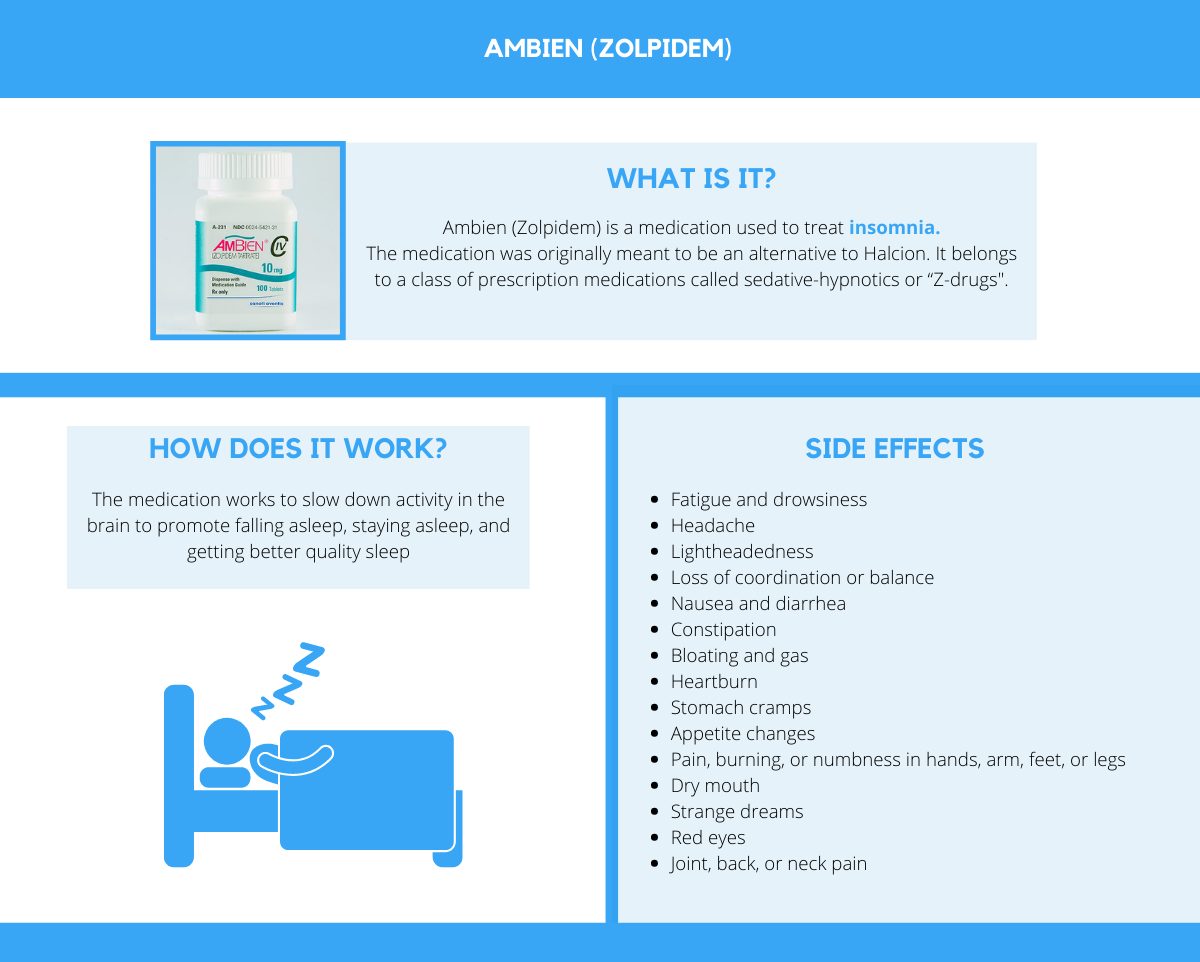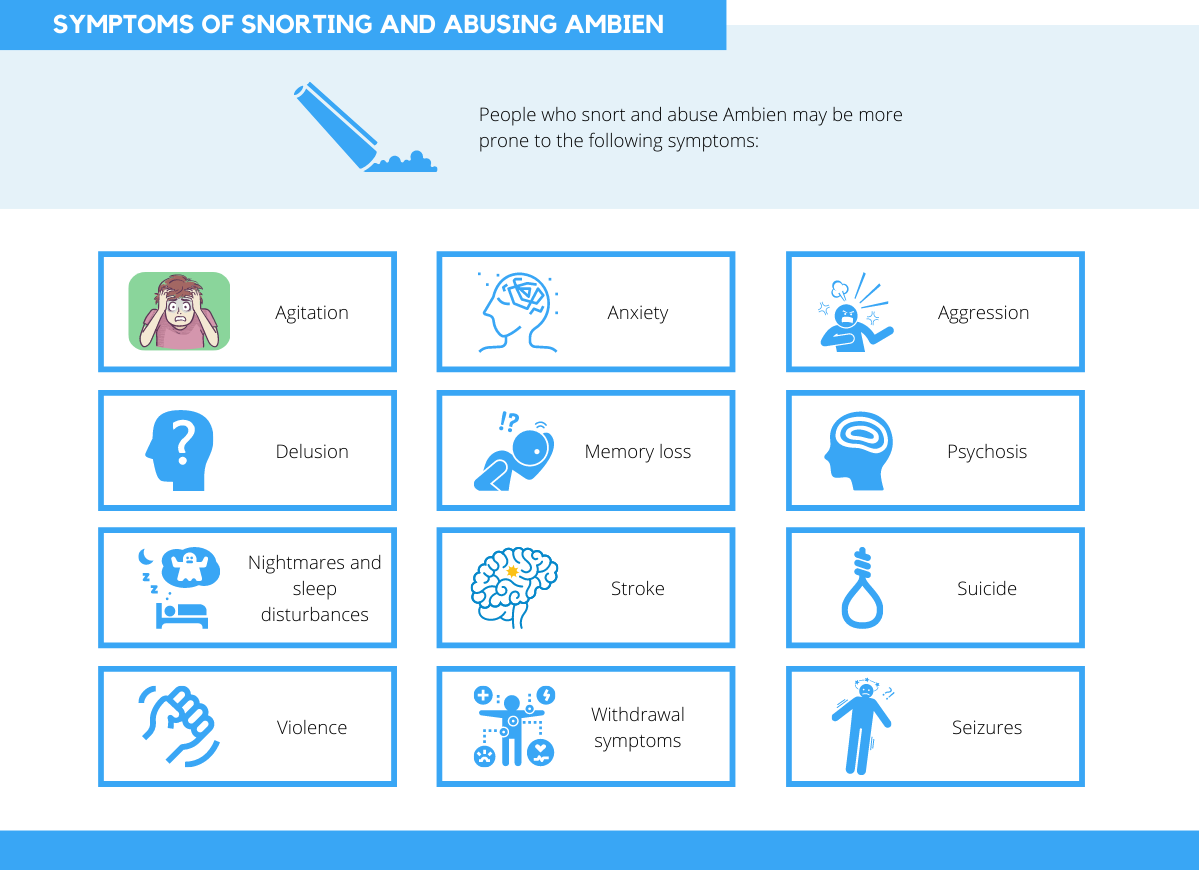Snorting Ambien is extremely dangerous and habit-forming. It can cause damage to the nose, accidental overdose, and unconscious behaviors while sleeping. In some cases, people who snort Ambien in the long-term may become dependent or addicted to the drug, resulting in dangerous withdrawal symptoms when they attempt to quit. Even though it is considered safe when taken as prescribed, abusing Ambien by means of insufflation can even lead to hallucinations, psychosis, and suicidal thoughts.
What is Ambien (Zolpidem)?

Ambien (Zolpidem) is a medication used to treat insomnia. The medication was originally meant to be an alternative to Halcion. It belongs to a class of prescription medications called sedative-hypnotics or “Z-drugs.” The medication works to slow down activity in the brain to promote falling asleep, staying asleep, and getting better quality sleep.
Although one of the most widely prescribed drugs for insomnia treatment, Ambien is not intended to be used for periods of time that exceed two weeks. Most people who take the medication for sleep problems will see sleep improvements within 7-10 days, however, taking Ambien for longer than intended can actually decrease sleep quality over time and lead to addiction.[1]
Why Do People Abuse Ambien?
The most common reason for Ambien abuse is to achieve feelings of euphoria and relaxation. As a sedative-hypnotic, Ambien slows down the central nervous system, producing relaxing sensations of calmness and sedation.
Someone who abuses Ambien over an extended period of time may notice that the medication starts to become less and less effective. If that person is addicted, he or she may begin crushing and snorting Ambien to achieve the same effects they once did by swallowing it.
Crushing and snorting pills help increase the surface area and bioavailability of the substance. It also reduces the amount of time needed for the substance to break the blood-brain barrier. In layman’s terms, snorting pills produces a faster and stronger high. It also increases the risk for dangerous side effects, damage to the nose and other areas of the body, and accidental overdose.
Ambien Side Effects
Like any medication, Ambien may cause a wide variety of side effects. Most side effects are minor and subside over time. People who abuse Ambien by taking too high of a dose or snorting the medication may be more susceptible to side effects.
Common side effects of Ambien include:[1]
- Fatigue and drowsiness
- Headache
- Lightheadedness
- Loss of coordination or balance
- Nausea and diarrhea
- Constipation
- Bloating and gas
- Heartburn
- Stomach cramps
- Appetite changes
- Pain, burning, or numbness in hands, arm, feet, or legs
- Dry mouth
- Strange dreams
- Red eyes
- Joint, back, or neck pain
Dangers of Snorting Ambien
![]()
Zolpidem is available in an oral tablet or an oral spray. It also comes in an instant release tablet or an extended-release version, known as Ambien CR. According to the drug’s label and the FDA, patients should not split, chew, or crush these tablets.[2] Altering Ambien away from its intended form, such as by crushing and snorting it, will increase the risk of side effects and put users in harm’s way.
Let’s take a look at some of the most concerning dangers of zolpidem insufflation.
Snorting Ambien Can Cause Nasal Damage
When someone snorts Ambien, their mucous membrane becomes extremely irritated. Repeated drug use further irritates the mucous membrane, potentially causing inflammation and nasal damage.
People who snort Ambien frequently may experience chronic nosebleeds, frequent runny nose, bad breath, and recurring sinus infections. Insufflation can also damage the cilia (small hairs) inside the nose that are responsible for filtering out foreign objects and cleaning the air people breathe.
Ambien may also contain fillers that can be extremely aggravating to the nasal passages. Long-term Ambien abuse may cause the nasal passages to become blocked, making breathing and smelling difficult. Chronic insufflation may also lead to loss of smell, whistling noises from the nose, or changes in the way someone’s voice sounds.
Other ways snorting Ambien can damage the nose include:
- Gradual but permanent bone loss
- Developing a hole between the nostrils, also referred to as a perforated septum
- Developing a hole or perforation in the roof of the mouth
- Loss of sense of smell
- Deviated septum
Ambien Abuse Increases The Risk of Dangerous Sleep-Related Behaviors
Ambien is notorious for leading to dangerous complex sleep-related behaviors. People who take Ambien have been found cooking, eating, walking, talking, and even driving while asleep. Abusing this drug in any way, including snorting it, can increase the risk of these behaviors.[3] Operating machinery, driving, and even walking can be dangerous while asleep because the individual has no control over their actions.
Additional Risks of Zolpidem Insufflation
Studies have found that abusing sedative-hypnotic drugs like Ambien can increase a person’s risk of many health problems including cancer, dementia, heart attack, depression, infection, and premature death.[3] Since people who snort Ambien are more likely to become physically dependent on the substance, they are also likely to use more of it over an extended period of time. This long-term use can make drug users more susceptible to all of these dangers.
Furthermore, Ambien produces short term effects similar to those of alcohol. People will have decreased inhibitions, poor judgment, lack of coordination, and slowed reflexes. This intoxicated state can put a person at risk of accidental injury, risky or illegal behaviors, and unprotected sex.
Lastly, the FDA reports that Ambien can lead to behavioral changes involving blackouts, suicidal thoughts, depression, struggles with mental health, and hallucinations.[2]

People who snort and abuse Ambien may be more prone to the following symptoms:
- Agitation
- Anxiety
- Aggression
- Delusion
- Memory loss
- Psychosis
- Nightmares and sleep disturbances
- Stroke
- Suicide
- Violence
- Withdrawal symptoms
- Seizures
Ambien Overdose Signs and Symptoms
Snorting Ambien may increase a person’s risk of overdose. Insufflation causes the substance to hit the bloodstream much faster, producing a more intense high. It can also be easy to take too much Ambien when snorting it, making it easy to accidentally overdose.
In the event of a suspected Ambien overdose, people should contact poison control or emergency medical services promptly. Symptoms of an Ambien overdose include:[1]
- Extreme drowsiness or inability to awaken
- Slowed breathing
- Slowed heart rate
- Coma
- Bluish lips or fingertips
Find Help for Ambien Addiction Today
If you or someone you know has been snorting Ambien, it’s time to consider getting help. Addiction treatment centers can help you overcome Ambien addiction with the help of medical detox and behavioral therapy. Don’t wait for the dangers of insufflation to damage your health – call now to get started on the road to recovery by learning about your treatment options.
References:













